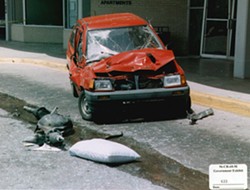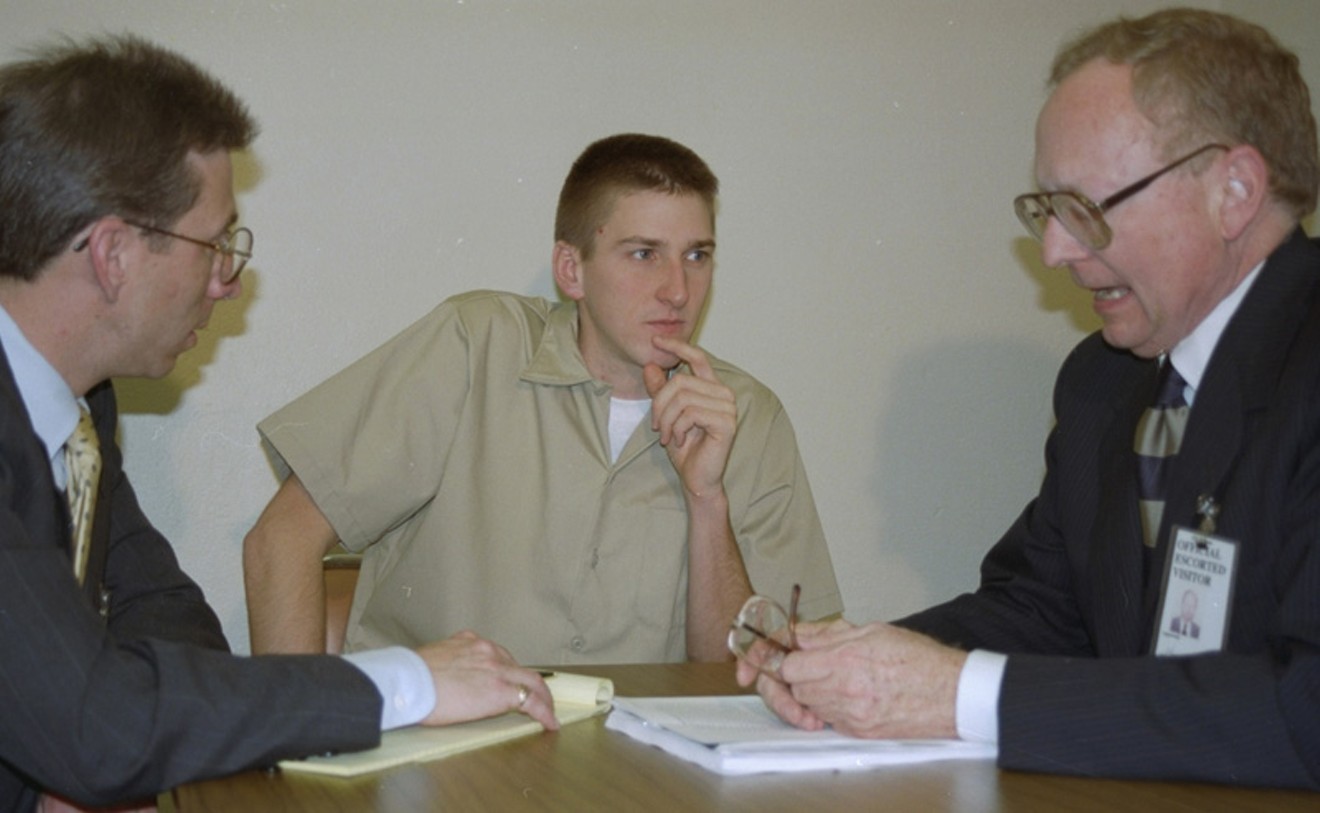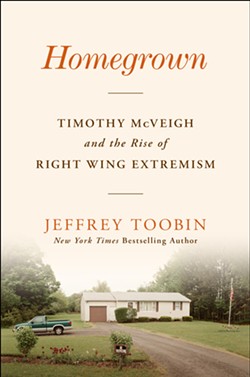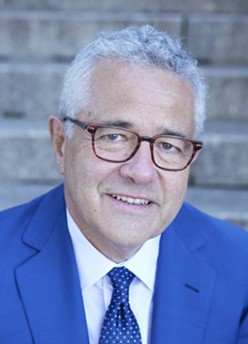To him, the armed intervention led by the ATF and FBI on the religious compound of the Branch Davidian sect in late February 1993 (originally to serve a legitimate search warrant for guns) represented everything he hated passionately about the United States as it related to personal freedoms, government interventions and control, and—most importantly—the right to possess and use firearms.
And when it all came to a fiery and deadly conclusion on April 19, he was determined to respond.
Two years later to the exact day, McVeigh stepped out of his rented Ryder truck just outside the Alfred P. Murrah Federal Building in Oklahoma City and lit a fuse.
The massive and powerful bombs sitting in the back bed blew up a good portion of the building, killing 168 people (including 15 children in the on-site daycare), injured scores more, and damaged 324 buildings in a 50-block area. He’d sent his message.
But McVeigh also set off a metaphorical bomb that day, a nearing three-decade old national odyssey and conflict about guns, militias, and political extremism. A fervent stew that, fueled by an online community that didn’t exist in 1995, culminated in the January 6, 2021 mob riot at the U.S. Capitol.
Author/lawyer/TV commentator Jeffrey Toobin connects the dots—and tells the fuller story of the ex-U.S. soldier and decorated Desert Storm veteran-turned-avenging angel and the culture helped to create, in Homegrown: Timothy McVeigh and the Rise of Right-Wing Extremism (432 pp., $29.99, Simon & Schuster).
“I guess the sentiment that struck me most in researching and writing this book was that the endurance and persistence of right-wing violence in the United States,” Toobin says on the phone.
“The line that always haunts me from my research was McVeigh telling his lawyers ‘There’s an army out there, but I could just never find it.’ And the difference between then and now is the internet and social media. And people with extreme views can find each other easily now.”
Homegrown documents McVeigh’s intense anger and exposure to extremism, formulating his views that would motivate him to murder. McVeigh’s opinions and beliefs were stoked and amplified by a variety of sources.
Newt Gingrich and Tom DeLay in Washington, D.C., Rush Limbaugh and Bill Cooper on the radio, people he met while serving in the Army, and his well-read copy of The Turner Diaries—a gruesome apocalyptic novel in which the U.S. government is fought then violently overthrown by self-described patriots and gun rights advocates, Jews and Blacks are the enemies, and includes a scene of a truck bomb blowing up FBI headquarters.
McVeigh not only read and re-read the book, he would order multiple copies to sell at gun shows as well as hand out to friends.
“Gun rights were at the center of his worldview,” Toobin writes. But so were other issues, according to McVeigh himself. “I want a country that operates like it did 150 years ago—no income taxes, no property taxes, no oppressive police, free land in the West,” the bomber said. He didn’t mention slavery, though his personal views were of both White and Male supremacy.
Toobin’s research for Homegrown included many fresh interviews—including with former President Bill Clinton and current Attorney General Merrick Garland. Garland was then with the U.S. Department of Justice and involved early with investigating the case and then building it against McVeigh. He was taken off to concentrate on another high-profile domestic terrorist provocateur…Ted Kaczynski, aka the Unabomber.
But the treasure trove was found in Austin at the Briscoe Center for American History. That’s where McVeigh’s lead lawyer, Stephen Jones, donated his entire trial archive for research: 635 boxes holding 1 million documents.
A controversial move in itself, given the concept of attorney-client privilege and the fact that McVeigh, who was executed in 2001, is not around to object. Toobin notes that Jones said McVeigh wanted the material available.
“The staff at the Briscoe Center was excellent, and there was a meticulous index of where and what things were. I’m incredibly indebted to them,” Toobin says.
“I have complicated feelings about Stephen Jones. He was handed an incredibly difficult assignment. Timothy McVeigh was proudly guilty of one of the worst crimes in American history. That is not an easy situation to navigate for any lawyer!”
Jones emerges as a significant figure in the book—and not always for the best reasons. Mainly, his insistence and determination to find a conspiracy or network of others who helped plan and execute the bombing—even though his eventually-estranged client told him over and over that there wasn’t. Still, Jones got to take taxpayer-funded trips around the world to investigate and chase what were non-existent leads.
Jones did have some successes for his client: separating his trial from accessory Terry Nichols and moving it out of Oklahoma City to Denver. But he also courted the media in a peacock-like fashion way. Toobin says he did send Jones a galley copy of the book, but has not heard from him since.
Homegrown also proves the theory that the bombing was really the direct of result of one man’s passion, vision, education (McVeigh had to learn how to make bombs from scratch), and execution. Again, all in pre-internet times.
“Frankly, just as a non-fiction narrative, Timothy McVeigh is a compelling character. He is deeply evil, but he did pull off something that was enormously difficult and showed tremendous resourcefulness and the kind of intelligence used to terribly evil ends,” Toobin says.
“But you have to acknowledge the skill in which he worked. Terry Nichols was almost as evil, but not nearly as skillful or talented. There’s no doubt that McVeigh was the driving force here.”

A blown away axle (on the ground) helped ID McVeigh's Ryder truck.
AP Photo/Justice Department, Courtesy of Simon & Schuster
Toobin’s greater thesis—as noted in the book’s subtitle and throughout the text—is drawing a direct line to the OKC bombing to the rise of right wing/gun/militia culture to the January 6 riots.
He writes that event was “the full flowering of McVeigh’s legacy in contemporary politics.” He also writes of those who “profess their love for their country but detest nearly everything about the contemporary United States.”
Still, he’s careful not to make his written paintbrush too wide a collection of bristles.
“The country is full of Trump supporters who are law-abiding citizens. I don’t think you can tar all Trump supporters with the mob in front of the Capitol. But that was a lot of people. There have been about 1,000 arrests, and there aren’t many circumstances in American history where you can identify 1,000 people committing a crime at the same time,” he says.
“The magnitude of January 6 is profound, and the urgency of the connection to [McVeigh] was shocking. I don’t want to associate all Trump supporters with the people on January 6. But I do want to associate the people on January 6 with Timothy McVeigh," he sums up.
"The belief that you can achieve political change through violence is one of the most important things that McVeigh and that group have in common. And that’s a scary thing for American history.”










